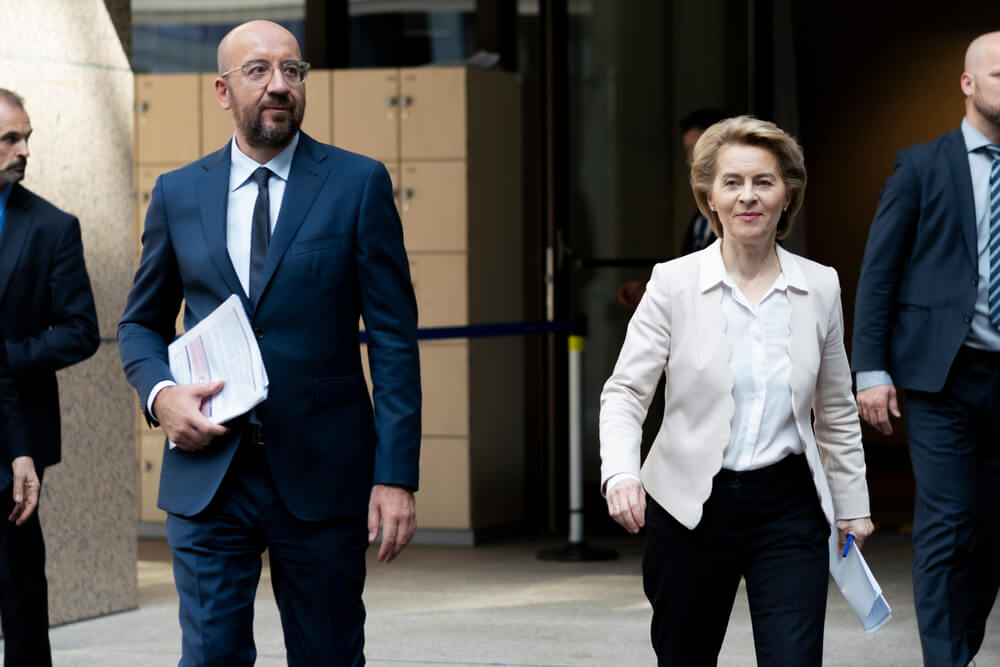A new EU regulation on punishing companies that contribute to circumventing sanctions against Russia will soon enter into force.
Such a heavy hammer, on which the European Parliament decided last week by a large majority, shows that even after more than 2 years, the EU still does not have an efficient mechanism to implement its economic blockade.
From the moment the EU Council confirms the Parliament's decision, all companies that circumvent sanctions against Russia will risk having their funds and assets frozen, travel bans for their managers, and other restrictions on business relations.
The European sanctions against Russia, introduced during the first days of aggression against Ukraine, had a strong effect on weakening the economic potential for waging a war of conquest.
However, even after a period of over 2 years, dozens of European companies continue operating in Russia.
Who is left doing business in Russia?
According to the most recent list from the Yale Chief Executive Leadership Institute, which has been tracking the withdrawal of foreign capital from Russia due to sanctions since the start of the aggression, 92 EU companies are still operating in Russia.
Most of them are from Germany (25), France (23), Italy (12), and Austria (7).
One of the more drastic cases, Austria's Raiffeisen Bank, has recently been warned by the US Treasury Department that it might be excluded from the US financial system if it does not suspend its operations in Russia.
Austria's Raiffeisen Bank remained the largest foreign bank in Russia
The Austrian bank remained the largest foreign bank in Russia, and it seems that even after many warnings, it will not easily give up this business, from which it generates as much as 60% of its total profits.
One of the largest European food producers, the French Danone, might be on its way to the final exit from Russia, where it continued to operate even after the introduction of European sanctions, but the hard way.
Last week, Vladimir Putin removed Danone from the list of foreign companies under Russian state management by signing a decree.
This de facto denationalisation of Danone, which has been under the administration of the Russian state since last June, possibly provides scope for the French food giant's intentions to sell its business to Chechen entrepreneurs close to the Kremlin.
Circumvention of sanctions nullifies their effect
Companies from the EU that continue to operate in Russia represent a small portion of the former substantial investment community, which eventually withdrew from Russia.
According to Yale's Chief Executive Leadership Institute's analysis, over a thousand companies have stopped doing business in Russia in the previous 2 years (including numerous European ones).
However, the alternative that has appeared in the meantime is more difficult to detect, even if it ultimately lowers the impact of economic sanctions, which seems to have been achieved through the direct withdrawal of European businesses.
Therefore, the new regulation of the European Parliament indicates the need to sanction more strictly those entities that export to Russia through third countries.
The extent of this detour, from which the regime in Moscow continues to benefit in its war efforts, is troubling.
According to one study, European manufacturers of "sensitive equipment" have nearly stopped exporting directly to Russia as a result of sanctions. However, shipments to third markets increased almost equally, indicating that they function as an intermediary for Russia and as a method for bypassing sanctions.
 The new European legislation should harmonise the behaviour of member states regarding the implementation of sanctions
The new European legislation should harmonise the behaviour of member states regarding the implementation of sanctions
The IÉSEG School of Management in Lille, France, discovered through research that from the start of Russia's war against Ukraine until September of last year, the European exports of products that could be used for military purposes were almost completely halted.
In that period, the export of those goods from the EU decreased by more than 95% (by more than €3.2 billion). However, in the same period and with almost the same volume (about €3 billion), the export of European producers of "sensitive" and dual products to markets such as Turkey, UAE or Kazakhstan increased.
It is apparent that the end effect of the sanctions is nullified in this manner, i.e., the system of sanctions on industrial and technology items crucial for military use has essentially no impact on Russia.
According to the estimate, the Royal United Services Institute (RUSI) relies upon, almost half of the equipment Russia imports for its warfare originates from countries that have imposed sanctions.
The new European legislation, awaiting final confirmation in the EU Council, should harmonise the behaviour of member states regarding the implementation of sanctions, particularly in preventing their circumvention through third countries as intermediaries.
This debate over how governments apply sanctions has created various loopholes in the sanctions’ regime, allowing them to be violated.